Legal and Ethical Responsibilities in the Care of Alzheimer's Patients
VerifiedAdded on 2023/06/04
|11
|3163
|146
Essay
AI Summary
This essay delves into the ethical and legal responsibilities inherent in patient care, using a case study of an Alzheimer's patient named Nancy and her husband Arthur. The essay identifies key ethical issues, such as respecting patient autonomy, showing love and compassion, and addressing familism and vulnerability, and explores relevant ethical principles including autonomy, confidentiality, beneficence, and discernment. It examines the practical application of these principles within a nursing context, considering the standards of practice and legal requirements for a registered nurse. The essay also discusses potential actions a nurse could take, such as assistive technology to manage patient movements and ensure the patient's well-being, and the hoped-for outcomes. The essay emphasizes the importance of ethical decision-making and the nurse's role in upholding patient rights and providing quality care.
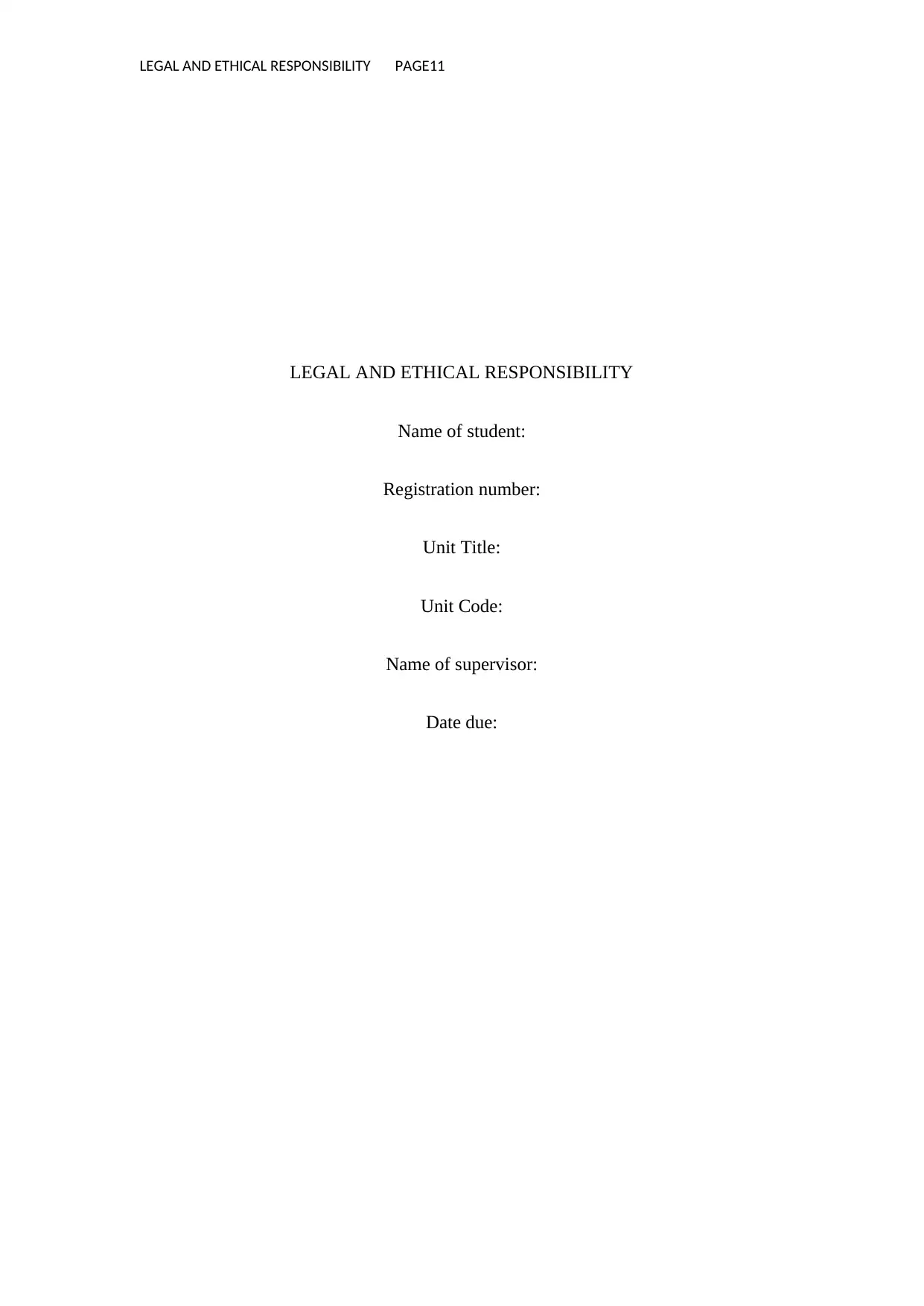
LEGAL AND ETHICAL RESPONSIBILITY PAGE11
LEGAL AND ETHICAL RESPONSIBILITY
Name of student:
Registration number:
Unit Title:
Unit Code:
Name of supervisor:
Date due:
LEGAL AND ETHICAL RESPONSIBILITY
Name of student:
Registration number:
Unit Title:
Unit Code:
Name of supervisor:
Date due:
Paraphrase This Document
Need a fresh take? Get an instant paraphrase of this document with our AI Paraphraser
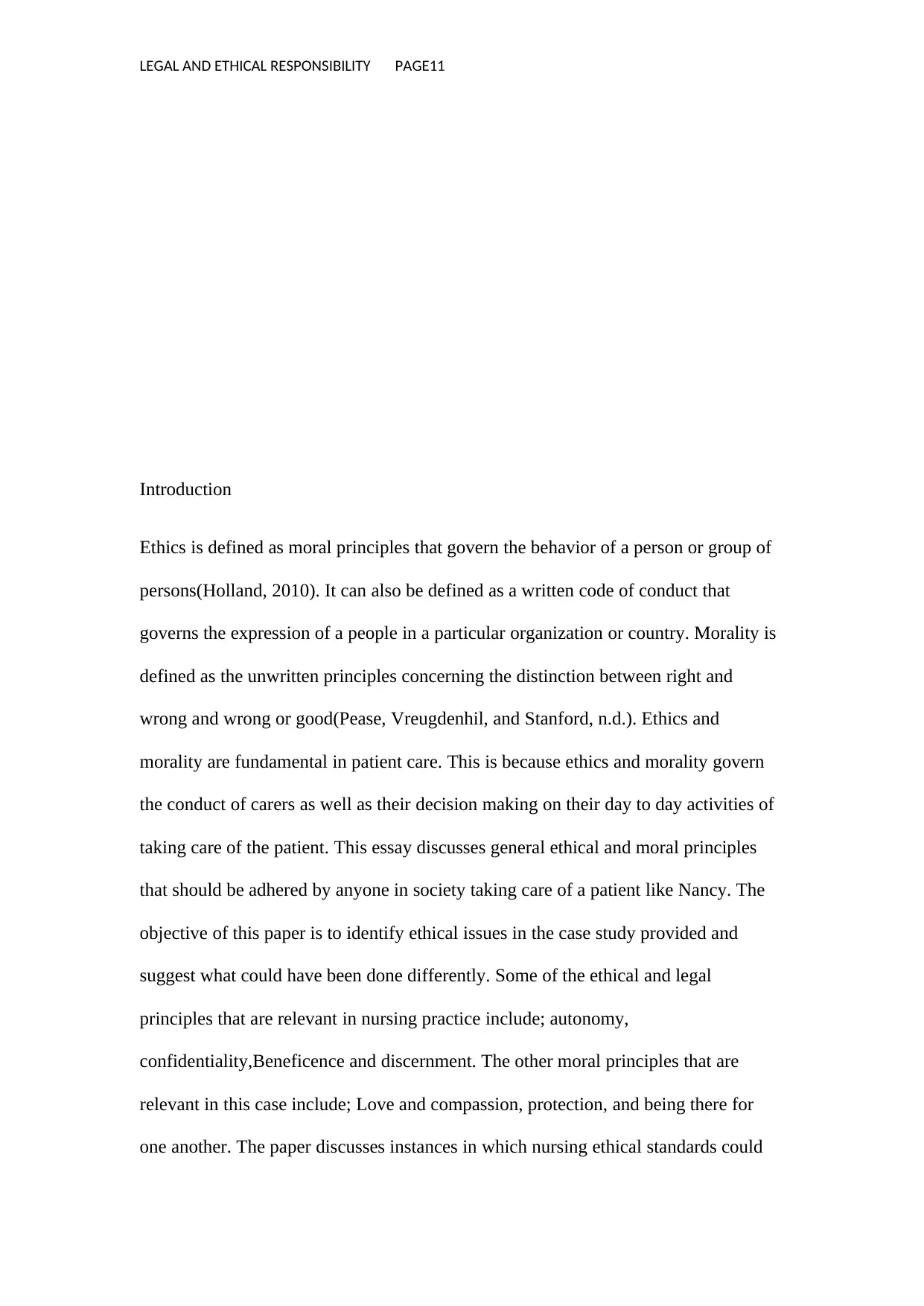
LEGAL AND ETHICAL RESPONSIBILITY PAGE11
Introduction
Ethics is defined as moral principles that govern the behavior of a person or group of
persons(Holland, 2010). It can also be defined as a written code of conduct that
governs the expression of a people in a particular organization or country. Morality is
defined as the unwritten principles concerning the distinction between right and
wrong and wrong or good(Pease, Vreugdenhil, and Stanford, n.d.). Ethics and
morality are fundamental in patient care. This is because ethics and morality govern
the conduct of carers as well as their decision making on their day to day activities of
taking care of the patient. This essay discusses general ethical and moral principles
that should be adhered by anyone in society taking care of a patient like Nancy. The
objective of this paper is to identify ethical issues in the case study provided and
suggest what could have been done differently. Some of the ethical and legal
principles that are relevant in nursing practice include; autonomy,
confidentiality,Beneficence and discernment. The other moral principles that are
relevant in this case include; Love and compassion, protection, and being there for
one another. The paper discusses instances in which nursing ethical standards could
Introduction
Ethics is defined as moral principles that govern the behavior of a person or group of
persons(Holland, 2010). It can also be defined as a written code of conduct that
governs the expression of a people in a particular organization or country. Morality is
defined as the unwritten principles concerning the distinction between right and
wrong and wrong or good(Pease, Vreugdenhil, and Stanford, n.d.). Ethics and
morality are fundamental in patient care. This is because ethics and morality govern
the conduct of carers as well as their decision making on their day to day activities of
taking care of the patient. This essay discusses general ethical and moral principles
that should be adhered by anyone in society taking care of a patient like Nancy. The
objective of this paper is to identify ethical issues in the case study provided and
suggest what could have been done differently. Some of the ethical and legal
principles that are relevant in nursing practice include; autonomy,
confidentiality,Beneficence and discernment. The other moral principles that are
relevant in this case include; Love and compassion, protection, and being there for
one another. The paper discusses instances in which nursing ethical standards could
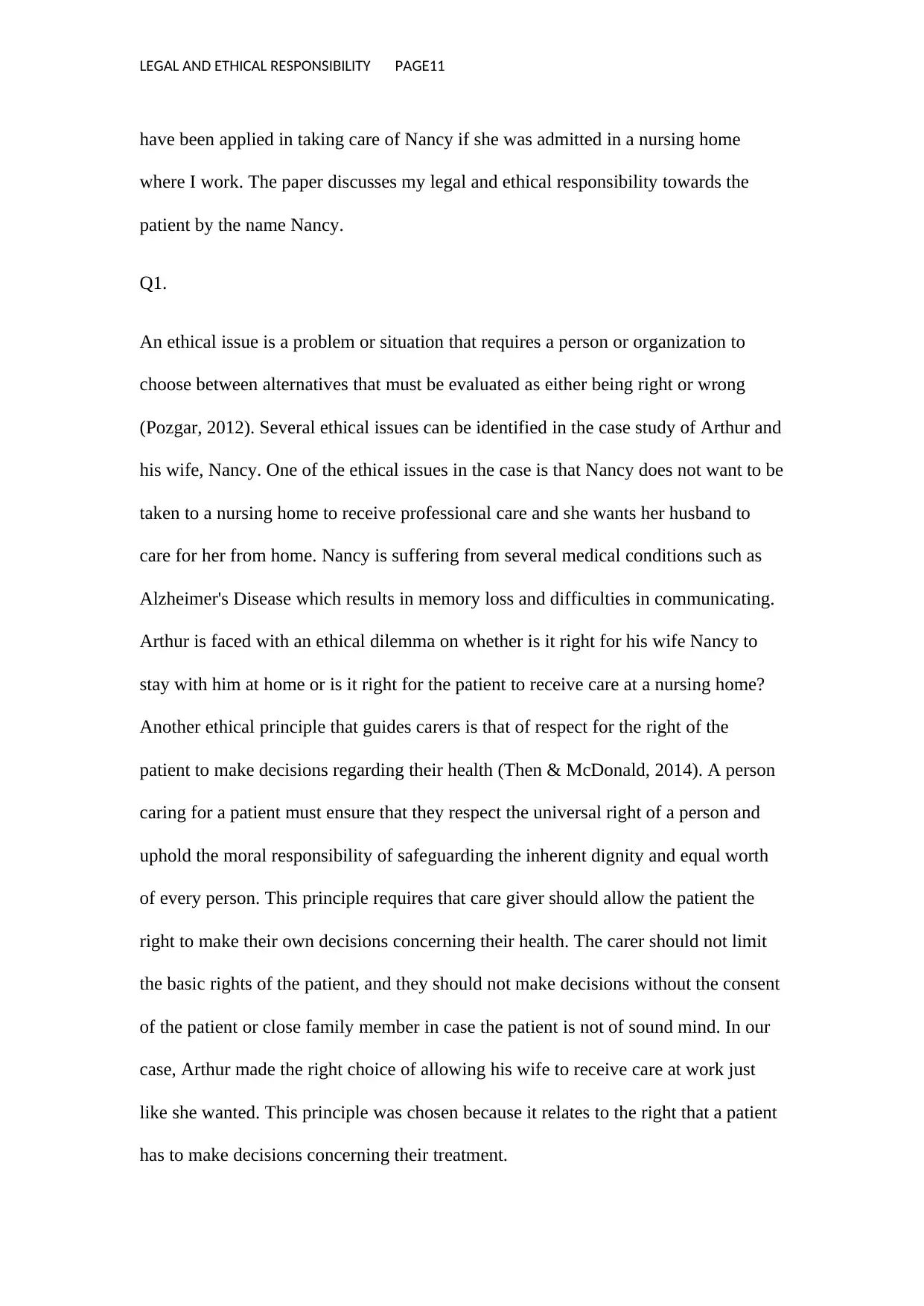
LEGAL AND ETHICAL RESPONSIBILITY PAGE11
have been applied in taking care of Nancy if she was admitted in a nursing home
where I work. The paper discusses my legal and ethical responsibility towards the
patient by the name Nancy.
Q1.
An ethical issue is a problem or situation that requires a person or organization to
choose between alternatives that must be evaluated as either being right or wrong
(Pozgar, 2012). Several ethical issues can be identified in the case study of Arthur and
his wife, Nancy. One of the ethical issues in the case is that Nancy does not want to be
taken to a nursing home to receive professional care and she wants her husband to
care for her from home. Nancy is suffering from several medical conditions such as
Alzheimer's Disease which results in memory loss and difficulties in communicating.
Arthur is faced with an ethical dilemma on whether is it right for his wife Nancy to
stay with him at home or is it right for the patient to receive care at a nursing home?
Another ethical principle that guides carers is that of respect for the right of the
patient to make decisions regarding their health (Then & McDonald, 2014). A person
caring for a patient must ensure that they respect the universal right of a person and
uphold the moral responsibility of safeguarding the inherent dignity and equal worth
of every person. This principle requires that care giver should allow the patient the
right to make their own decisions concerning their health. The carer should not limit
the basic rights of the patient, and they should not make decisions without the consent
of the patient or close family member in case the patient is not of sound mind. In our
case, Arthur made the right choice of allowing his wife to receive care at work just
like she wanted. This principle was chosen because it relates to the right that a patient
has to make decisions concerning their treatment.
have been applied in taking care of Nancy if she was admitted in a nursing home
where I work. The paper discusses my legal and ethical responsibility towards the
patient by the name Nancy.
Q1.
An ethical issue is a problem or situation that requires a person or organization to
choose between alternatives that must be evaluated as either being right or wrong
(Pozgar, 2012). Several ethical issues can be identified in the case study of Arthur and
his wife, Nancy. One of the ethical issues in the case is that Nancy does not want to be
taken to a nursing home to receive professional care and she wants her husband to
care for her from home. Nancy is suffering from several medical conditions such as
Alzheimer's Disease which results in memory loss and difficulties in communicating.
Arthur is faced with an ethical dilemma on whether is it right for his wife Nancy to
stay with him at home or is it right for the patient to receive care at a nursing home?
Another ethical principle that guides carers is that of respect for the right of the
patient to make decisions regarding their health (Then & McDonald, 2014). A person
caring for a patient must ensure that they respect the universal right of a person and
uphold the moral responsibility of safeguarding the inherent dignity and equal worth
of every person. This principle requires that care giver should allow the patient the
right to make their own decisions concerning their health. The carer should not limit
the basic rights of the patient, and they should not make decisions without the consent
of the patient or close family member in case the patient is not of sound mind. In our
case, Arthur made the right choice of allowing his wife to receive care at work just
like she wanted. This principle was chosen because it relates to the right that a patient
has to make decisions concerning their treatment.
⊘ This is a preview!⊘
Do you want full access?
Subscribe today to unlock all pages.

Trusted by 1+ million students worldwide
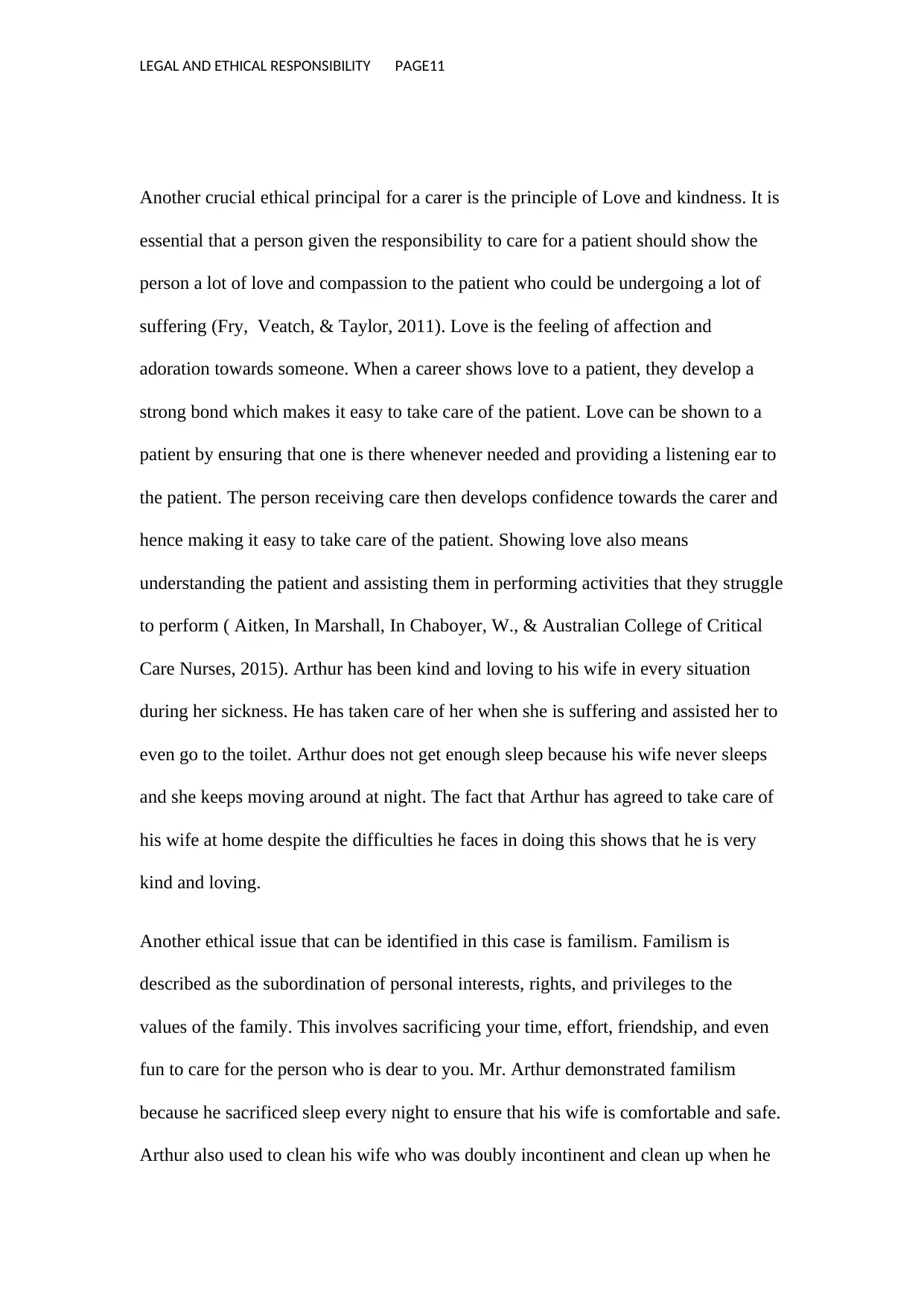
LEGAL AND ETHICAL RESPONSIBILITY PAGE11
Another crucial ethical principal for a carer is the principle of Love and kindness. It is
essential that a person given the responsibility to care for a patient should show the
person a lot of love and compassion to the patient who could be undergoing a lot of
suffering (Fry, Veatch, & Taylor, 2011). Love is the feeling of affection and
adoration towards someone. When a career shows love to a patient, they develop a
strong bond which makes it easy to take care of the patient. Love can be shown to a
patient by ensuring that one is there whenever needed and providing a listening ear to
the patient. The person receiving care then develops confidence towards the carer and
hence making it easy to take care of the patient. Showing love also means
understanding the patient and assisting them in performing activities that they struggle
to perform ( Aitken, In Marshall, In Chaboyer, W., & Australian College of Critical
Care Nurses, 2015). Arthur has been kind and loving to his wife in every situation
during her sickness. He has taken care of her when she is suffering and assisted her to
even go to the toilet. Arthur does not get enough sleep because his wife never sleeps
and she keeps moving around at night. The fact that Arthur has agreed to take care of
his wife at home despite the difficulties he faces in doing this shows that he is very
kind and loving.
Another ethical issue that can be identified in this case is familism. Familism is
described as the subordination of personal interests, rights, and privileges to the
values of the family. This involves sacrificing your time, effort, friendship, and even
fun to care for the person who is dear to you. Mr. Arthur demonstrated familism
because he sacrificed sleep every night to ensure that his wife is comfortable and safe.
Arthur also used to clean his wife who was doubly incontinent and clean up when he
Another crucial ethical principal for a carer is the principle of Love and kindness. It is
essential that a person given the responsibility to care for a patient should show the
person a lot of love and compassion to the patient who could be undergoing a lot of
suffering (Fry, Veatch, & Taylor, 2011). Love is the feeling of affection and
adoration towards someone. When a career shows love to a patient, they develop a
strong bond which makes it easy to take care of the patient. Love can be shown to a
patient by ensuring that one is there whenever needed and providing a listening ear to
the patient. The person receiving care then develops confidence towards the carer and
hence making it easy to take care of the patient. Showing love also means
understanding the patient and assisting them in performing activities that they struggle
to perform ( Aitken, In Marshall, In Chaboyer, W., & Australian College of Critical
Care Nurses, 2015). Arthur has been kind and loving to his wife in every situation
during her sickness. He has taken care of her when she is suffering and assisted her to
even go to the toilet. Arthur does not get enough sleep because his wife never sleeps
and she keeps moving around at night. The fact that Arthur has agreed to take care of
his wife at home despite the difficulties he faces in doing this shows that he is very
kind and loving.
Another ethical issue that can be identified in this case is familism. Familism is
described as the subordination of personal interests, rights, and privileges to the
values of the family. This involves sacrificing your time, effort, friendship, and even
fun to care for the person who is dear to you. Mr. Arthur demonstrated familism
because he sacrificed sleep every night to ensure that his wife is comfortable and safe.
Arthur also used to clean his wife who was doubly incontinent and clean up when he
Paraphrase This Document
Need a fresh take? Get an instant paraphrase of this document with our AI Paraphraser
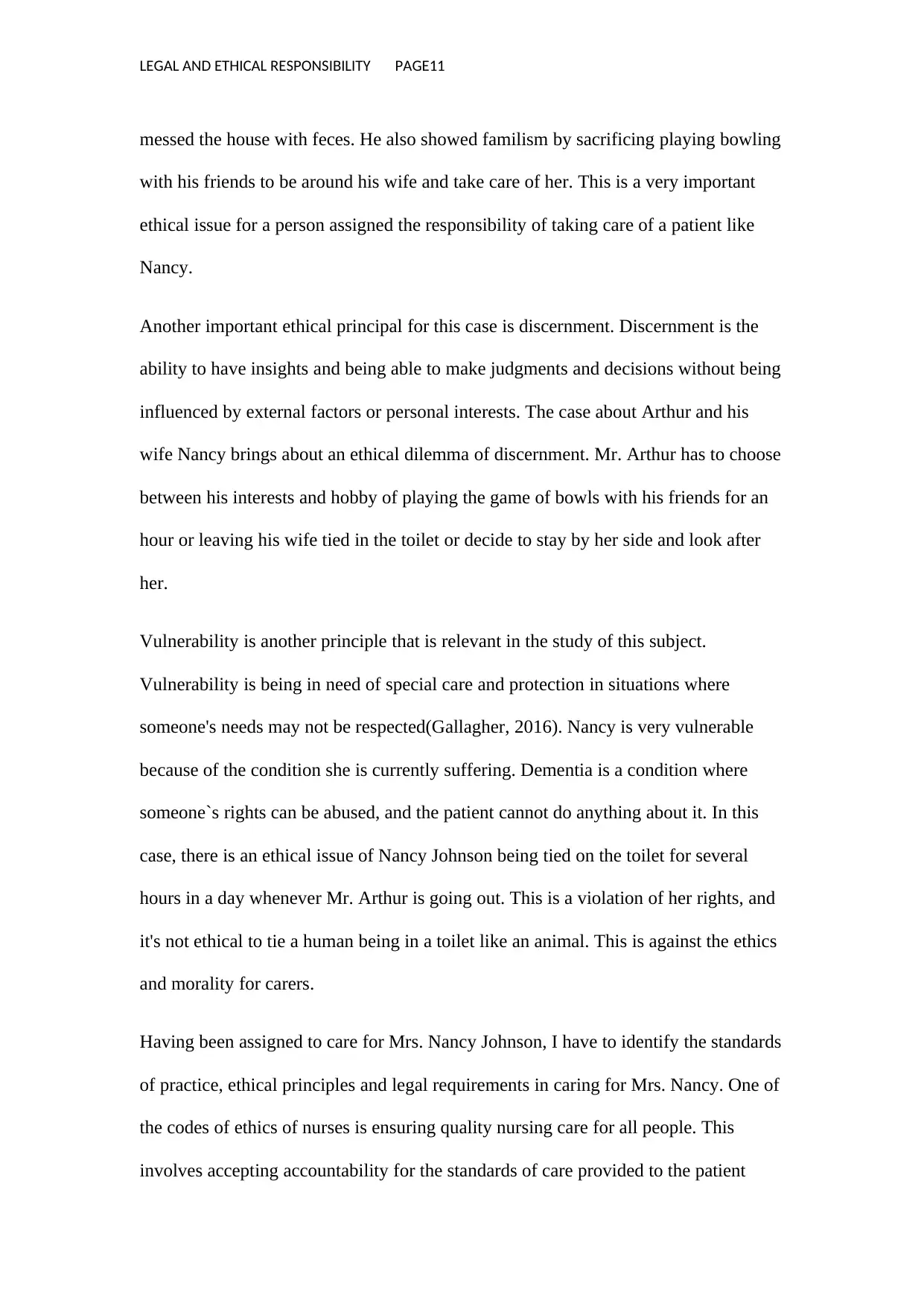
LEGAL AND ETHICAL RESPONSIBILITY PAGE11
messed the house with feces. He also showed familism by sacrificing playing bowling
with his friends to be around his wife and take care of her. This is a very important
ethical issue for a person assigned the responsibility of taking care of a patient like
Nancy.
Another important ethical principal for this case is discernment. Discernment is the
ability to have insights and being able to make judgments and decisions without being
influenced by external factors or personal interests. The case about Arthur and his
wife Nancy brings about an ethical dilemma of discernment. Mr. Arthur has to choose
between his interests and hobby of playing the game of bowls with his friends for an
hour or leaving his wife tied in the toilet or decide to stay by her side and look after
her.
Vulnerability is another principle that is relevant in the study of this subject.
Vulnerability is being in need of special care and protection in situations where
someone's needs may not be respected(Gallagher, 2016). Nancy is very vulnerable
because of the condition she is currently suffering. Dementia is a condition where
someone`s rights can be abused, and the patient cannot do anything about it. In this
case, there is an ethical issue of Nancy Johnson being tied on the toilet for several
hours in a day whenever Mr. Arthur is going out. This is a violation of her rights, and
it's not ethical to tie a human being in a toilet like an animal. This is against the ethics
and morality for carers.
Having been assigned to care for Mrs. Nancy Johnson, I have to identify the standards
of practice, ethical principles and legal requirements in caring for Mrs. Nancy. One of
the codes of ethics of nurses is ensuring quality nursing care for all people. This
involves accepting accountability for the standards of care provided to the patient
messed the house with feces. He also showed familism by sacrificing playing bowling
with his friends to be around his wife and take care of her. This is a very important
ethical issue for a person assigned the responsibility of taking care of a patient like
Nancy.
Another important ethical principal for this case is discernment. Discernment is the
ability to have insights and being able to make judgments and decisions without being
influenced by external factors or personal interests. The case about Arthur and his
wife Nancy brings about an ethical dilemma of discernment. Mr. Arthur has to choose
between his interests and hobby of playing the game of bowls with his friends for an
hour or leaving his wife tied in the toilet or decide to stay by her side and look after
her.
Vulnerability is another principle that is relevant in the study of this subject.
Vulnerability is being in need of special care and protection in situations where
someone's needs may not be respected(Gallagher, 2016). Nancy is very vulnerable
because of the condition she is currently suffering. Dementia is a condition where
someone`s rights can be abused, and the patient cannot do anything about it. In this
case, there is an ethical issue of Nancy Johnson being tied on the toilet for several
hours in a day whenever Mr. Arthur is going out. This is a violation of her rights, and
it's not ethical to tie a human being in a toilet like an animal. This is against the ethics
and morality for carers.
Having been assigned to care for Mrs. Nancy Johnson, I have to identify the standards
of practice, ethical principles and legal requirements in caring for Mrs. Nancy. One of
the codes of ethics of nurses is ensuring quality nursing care for all people. This
involves accepting accountability for the standards of care provided to the patient
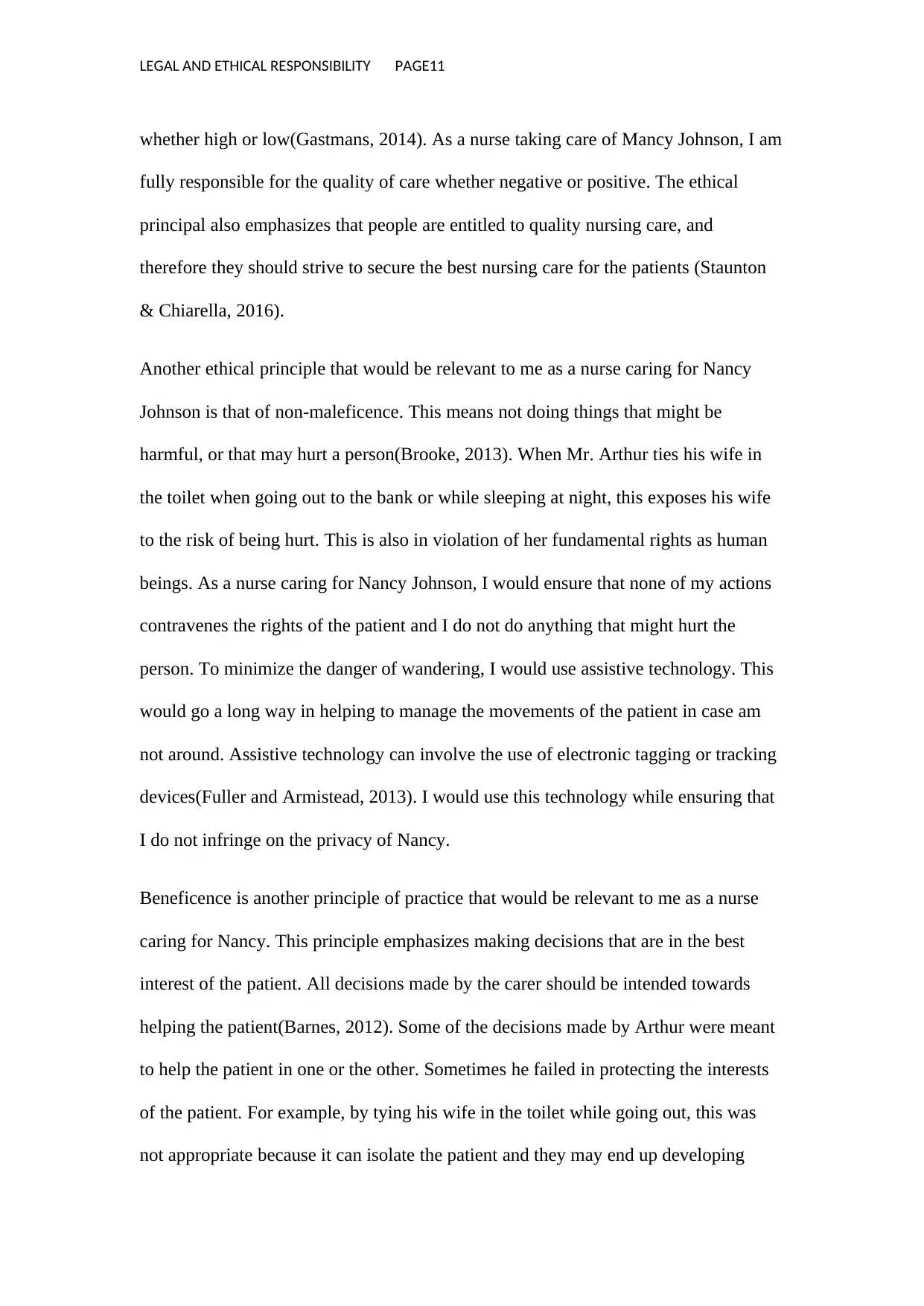
LEGAL AND ETHICAL RESPONSIBILITY PAGE11
whether high or low(Gastmans, 2014). As a nurse taking care of Mancy Johnson, I am
fully responsible for the quality of care whether negative or positive. The ethical
principal also emphasizes that people are entitled to quality nursing care, and
therefore they should strive to secure the best nursing care for the patients (Staunton
& Chiarella, 2016).
Another ethical principle that would be relevant to me as a nurse caring for Nancy
Johnson is that of non-maleficence. This means not doing things that might be
harmful, or that may hurt a person(Brooke, 2013). When Mr. Arthur ties his wife in
the toilet when going out to the bank or while sleeping at night, this exposes his wife
to the risk of being hurt. This is also in violation of her fundamental rights as human
beings. As a nurse caring for Nancy Johnson, I would ensure that none of my actions
contravenes the rights of the patient and I do not do anything that might hurt the
person. To minimize the danger of wandering, I would use assistive technology. This
would go a long way in helping to manage the movements of the patient in case am
not around. Assistive technology can involve the use of electronic tagging or tracking
devices(Fuller and Armistead, 2013). I would use this technology while ensuring that
I do not infringe on the privacy of Nancy.
Beneficence is another principle of practice that would be relevant to me as a nurse
caring for Nancy. This principle emphasizes making decisions that are in the best
interest of the patient. All decisions made by the carer should be intended towards
helping the patient(Barnes, 2012). Some of the decisions made by Arthur were meant
to help the patient in one or the other. Sometimes he failed in protecting the interests
of the patient. For example, by tying his wife in the toilet while going out, this was
not appropriate because it can isolate the patient and they may end up developing
whether high or low(Gastmans, 2014). As a nurse taking care of Mancy Johnson, I am
fully responsible for the quality of care whether negative or positive. The ethical
principal also emphasizes that people are entitled to quality nursing care, and
therefore they should strive to secure the best nursing care for the patients (Staunton
& Chiarella, 2016).
Another ethical principle that would be relevant to me as a nurse caring for Nancy
Johnson is that of non-maleficence. This means not doing things that might be
harmful, or that may hurt a person(Brooke, 2013). When Mr. Arthur ties his wife in
the toilet when going out to the bank or while sleeping at night, this exposes his wife
to the risk of being hurt. This is also in violation of her fundamental rights as human
beings. As a nurse caring for Nancy Johnson, I would ensure that none of my actions
contravenes the rights of the patient and I do not do anything that might hurt the
person. To minimize the danger of wandering, I would use assistive technology. This
would go a long way in helping to manage the movements of the patient in case am
not around. Assistive technology can involve the use of electronic tagging or tracking
devices(Fuller and Armistead, 2013). I would use this technology while ensuring that
I do not infringe on the privacy of Nancy.
Beneficence is another principle of practice that would be relevant to me as a nurse
caring for Nancy. This principle emphasizes making decisions that are in the best
interest of the patient. All decisions made by the carer should be intended towards
helping the patient(Barnes, 2012). Some of the decisions made by Arthur were meant
to help the patient in one or the other. Sometimes he failed in protecting the interests
of the patient. For example, by tying his wife in the toilet while going out, this was
not appropriate because it can isolate the patient and they may end up developing
⊘ This is a preview!⊘
Do you want full access?
Subscribe today to unlock all pages.

Trusted by 1+ million students worldwide
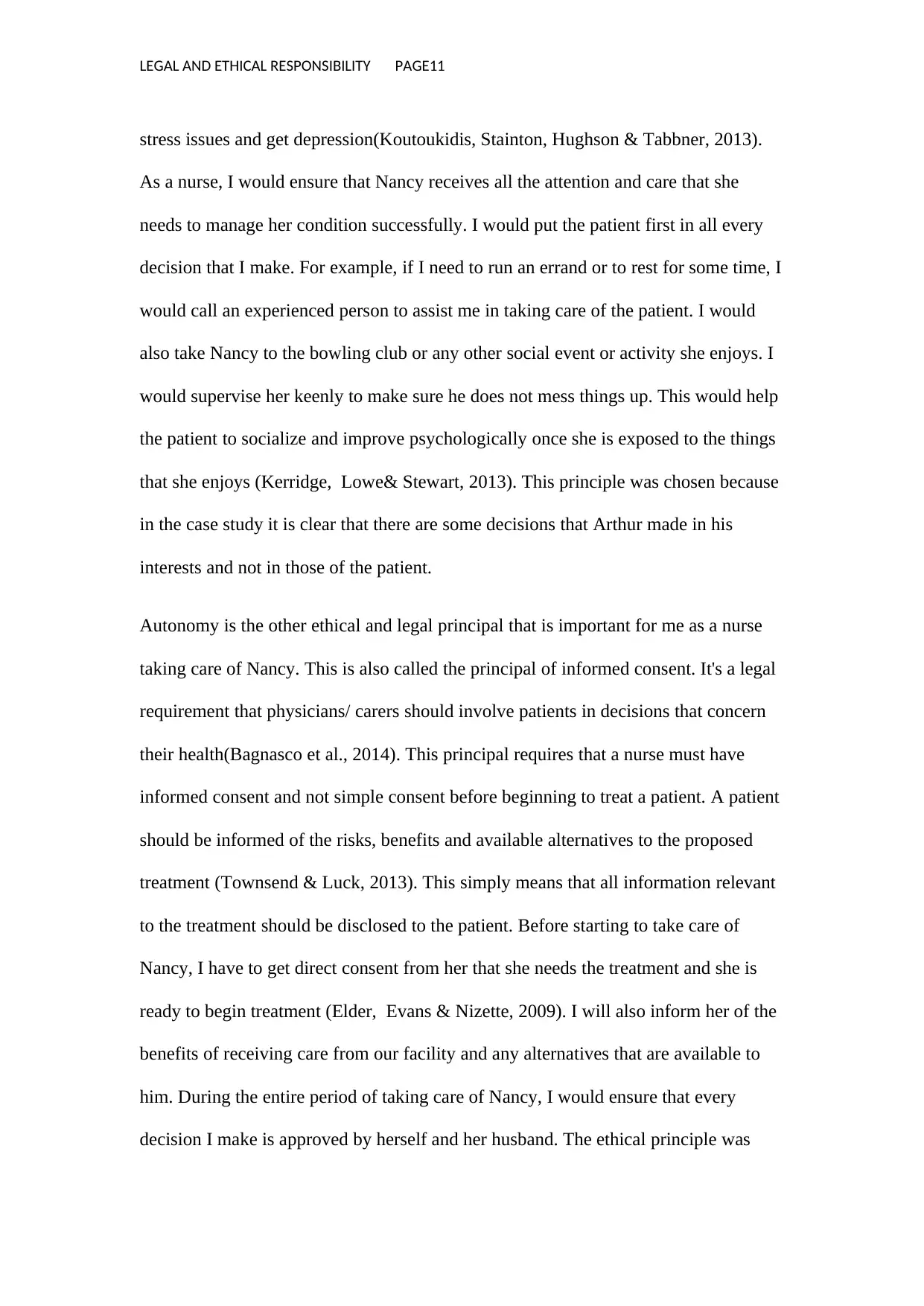
LEGAL AND ETHICAL RESPONSIBILITY PAGE11
stress issues and get depression(Koutoukidis, Stainton, Hughson & Tabbner, 2013).
As a nurse, I would ensure that Nancy receives all the attention and care that she
needs to manage her condition successfully. I would put the patient first in all every
decision that I make. For example, if I need to run an errand or to rest for some time, I
would call an experienced person to assist me in taking care of the patient. I would
also take Nancy to the bowling club or any other social event or activity she enjoys. I
would supervise her keenly to make sure he does not mess things up. This would help
the patient to socialize and improve psychologically once she is exposed to the things
that she enjoys (Kerridge, Lowe& Stewart, 2013). This principle was chosen because
in the case study it is clear that there are some decisions that Arthur made in his
interests and not in those of the patient.
Autonomy is the other ethical and legal principal that is important for me as a nurse
taking care of Nancy. This is also called the principal of informed consent. It's a legal
requirement that physicians/ carers should involve patients in decisions that concern
their health(Bagnasco et al., 2014). This principal requires that a nurse must have
informed consent and not simple consent before beginning to treat a patient. A patient
should be informed of the risks, benefits and available alternatives to the proposed
treatment (Townsend & Luck, 2013). This simply means that all information relevant
to the treatment should be disclosed to the patient. Before starting to take care of
Nancy, I have to get direct consent from her that she needs the treatment and she is
ready to begin treatment (Elder, Evans & Nizette, 2009). I will also inform her of the
benefits of receiving care from our facility and any alternatives that are available to
him. During the entire period of taking care of Nancy, I would ensure that every
decision I make is approved by herself and her husband. The ethical principle was
stress issues and get depression(Koutoukidis, Stainton, Hughson & Tabbner, 2013).
As a nurse, I would ensure that Nancy receives all the attention and care that she
needs to manage her condition successfully. I would put the patient first in all every
decision that I make. For example, if I need to run an errand or to rest for some time, I
would call an experienced person to assist me in taking care of the patient. I would
also take Nancy to the bowling club or any other social event or activity she enjoys. I
would supervise her keenly to make sure he does not mess things up. This would help
the patient to socialize and improve psychologically once she is exposed to the things
that she enjoys (Kerridge, Lowe& Stewart, 2013). This principle was chosen because
in the case study it is clear that there are some decisions that Arthur made in his
interests and not in those of the patient.
Autonomy is the other ethical and legal principal that is important for me as a nurse
taking care of Nancy. This is also called the principal of informed consent. It's a legal
requirement that physicians/ carers should involve patients in decisions that concern
their health(Bagnasco et al., 2014). This principal requires that a nurse must have
informed consent and not simple consent before beginning to treat a patient. A patient
should be informed of the risks, benefits and available alternatives to the proposed
treatment (Townsend & Luck, 2013). This simply means that all information relevant
to the treatment should be disclosed to the patient. Before starting to take care of
Nancy, I have to get direct consent from her that she needs the treatment and she is
ready to begin treatment (Elder, Evans & Nizette, 2009). I will also inform her of the
benefits of receiving care from our facility and any alternatives that are available to
him. During the entire period of taking care of Nancy, I would ensure that every
decision I make is approved by herself and her husband. The ethical principle was
Paraphrase This Document
Need a fresh take? Get an instant paraphrase of this document with our AI Paraphraser
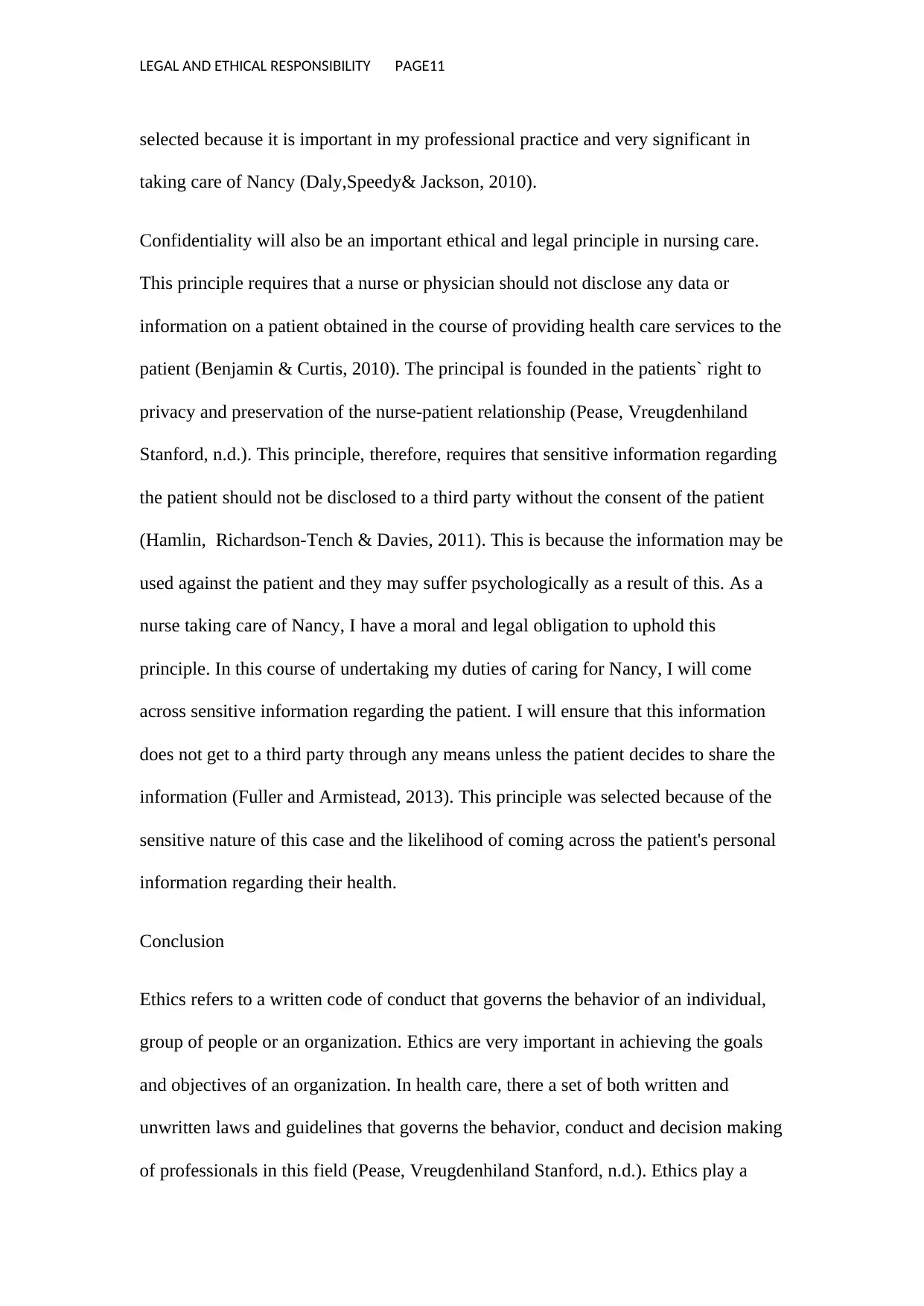
LEGAL AND ETHICAL RESPONSIBILITY PAGE11
selected because it is important in my professional practice and very significant in
taking care of Nancy (Daly,Speedy& Jackson, 2010).
Confidentiality will also be an important ethical and legal principle in nursing care.
This principle requires that a nurse or physician should not disclose any data or
information on a patient obtained in the course of providing health care services to the
patient (Benjamin & Curtis, 2010). The principal is founded in the patients` right to
privacy and preservation of the nurse-patient relationship (Pease, Vreugdenhiland
Stanford, n.d.). This principle, therefore, requires that sensitive information regarding
the patient should not be disclosed to a third party without the consent of the patient
(Hamlin, Richardson-Tench & Davies, 2011). This is because the information may be
used against the patient and they may suffer psychologically as a result of this. As a
nurse taking care of Nancy, I have a moral and legal obligation to uphold this
principle. In this course of undertaking my duties of caring for Nancy, I will come
across sensitive information regarding the patient. I will ensure that this information
does not get to a third party through any means unless the patient decides to share the
information (Fuller and Armistead, 2013). This principle was selected because of the
sensitive nature of this case and the likelihood of coming across the patient's personal
information regarding their health.
Conclusion
Ethics refers to a written code of conduct that governs the behavior of an individual,
group of people or an organization. Ethics are very important in achieving the goals
and objectives of an organization. In health care, there a set of both written and
unwritten laws and guidelines that governs the behavior, conduct and decision making
of professionals in this field (Pease, Vreugdenhiland Stanford, n.d.). Ethics play a
selected because it is important in my professional practice and very significant in
taking care of Nancy (Daly,Speedy& Jackson, 2010).
Confidentiality will also be an important ethical and legal principle in nursing care.
This principle requires that a nurse or physician should not disclose any data or
information on a patient obtained in the course of providing health care services to the
patient (Benjamin & Curtis, 2010). The principal is founded in the patients` right to
privacy and preservation of the nurse-patient relationship (Pease, Vreugdenhiland
Stanford, n.d.). This principle, therefore, requires that sensitive information regarding
the patient should not be disclosed to a third party without the consent of the patient
(Hamlin, Richardson-Tench & Davies, 2011). This is because the information may be
used against the patient and they may suffer psychologically as a result of this. As a
nurse taking care of Nancy, I have a moral and legal obligation to uphold this
principle. In this course of undertaking my duties of caring for Nancy, I will come
across sensitive information regarding the patient. I will ensure that this information
does not get to a third party through any means unless the patient decides to share the
information (Fuller and Armistead, 2013). This principle was selected because of the
sensitive nature of this case and the likelihood of coming across the patient's personal
information regarding their health.
Conclusion
Ethics refers to a written code of conduct that governs the behavior of an individual,
group of people or an organization. Ethics are very important in achieving the goals
and objectives of an organization. In health care, there a set of both written and
unwritten laws and guidelines that governs the behavior, conduct and decision making
of professionals in this field (Pease, Vreugdenhiland Stanford, n.d.). Ethics play a
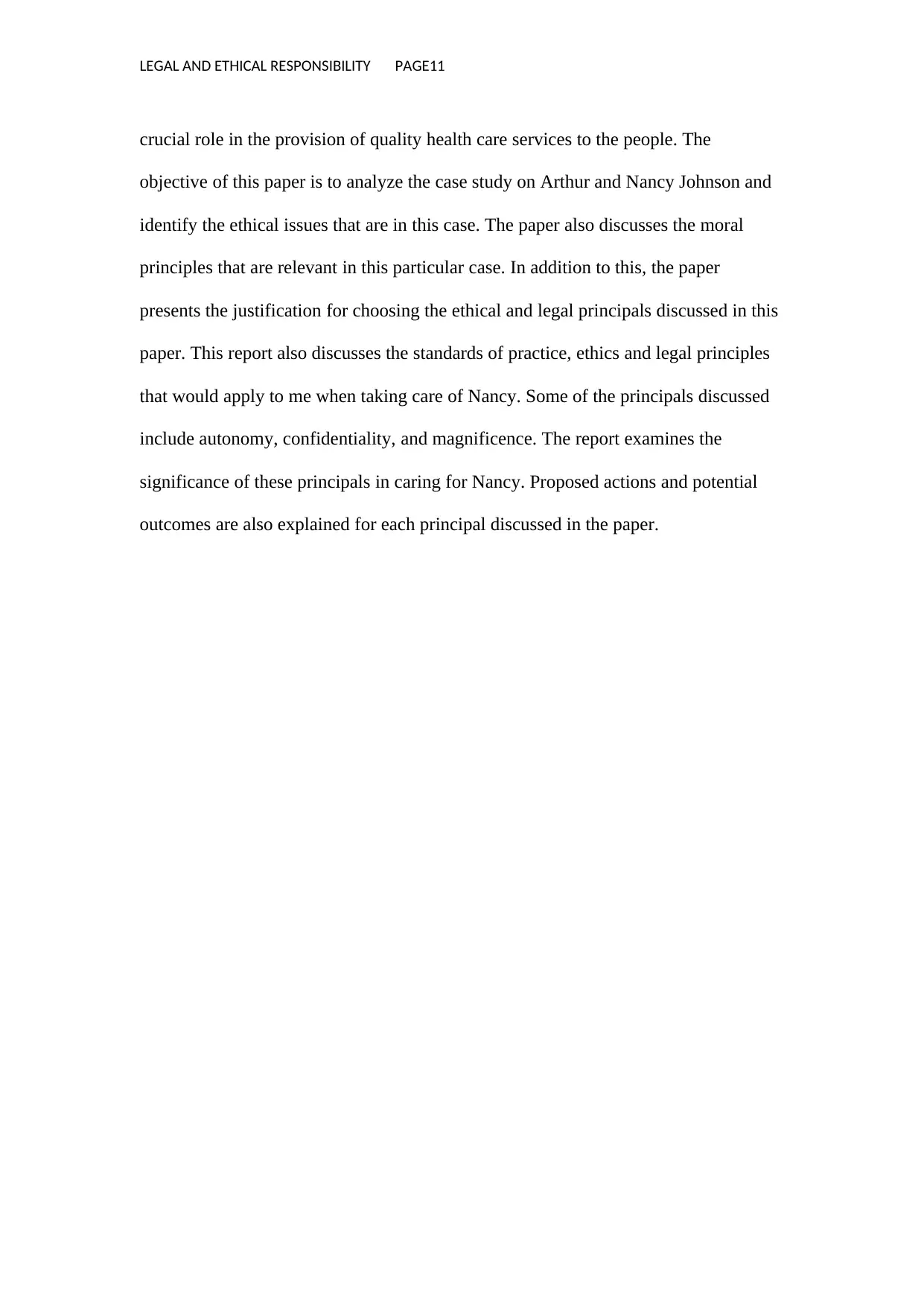
LEGAL AND ETHICAL RESPONSIBILITY PAGE11
crucial role in the provision of quality health care services to the people. The
objective of this paper is to analyze the case study on Arthur and Nancy Johnson and
identify the ethical issues that are in this case. The paper also discusses the moral
principles that are relevant in this particular case. In addition to this, the paper
presents the justification for choosing the ethical and legal principals discussed in this
paper. This report also discusses the standards of practice, ethics and legal principles
that would apply to me when taking care of Nancy. Some of the principals discussed
include autonomy, confidentiality, and magnificence. The report examines the
significance of these principals in caring for Nancy. Proposed actions and potential
outcomes are also explained for each principal discussed in the paper.
crucial role in the provision of quality health care services to the people. The
objective of this paper is to analyze the case study on Arthur and Nancy Johnson and
identify the ethical issues that are in this case. The paper also discusses the moral
principles that are relevant in this particular case. In addition to this, the paper
presents the justification for choosing the ethical and legal principals discussed in this
paper. This report also discusses the standards of practice, ethics and legal principles
that would apply to me when taking care of Nancy. Some of the principals discussed
include autonomy, confidentiality, and magnificence. The report examines the
significance of these principals in caring for Nancy. Proposed actions and potential
outcomes are also explained for each principal discussed in the paper.
⊘ This is a preview!⊘
Do you want full access?
Subscribe today to unlock all pages.

Trusted by 1+ million students worldwide
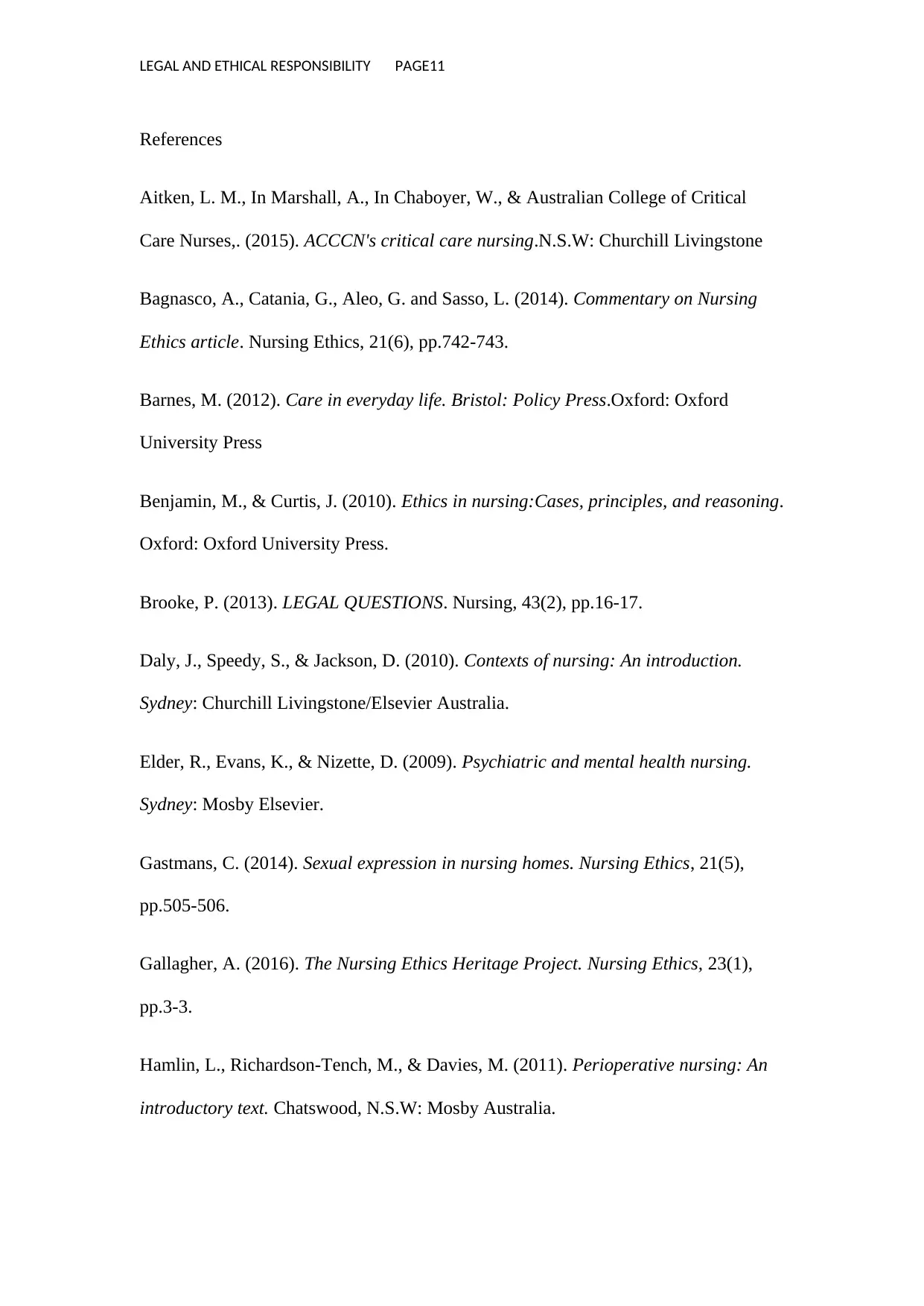
LEGAL AND ETHICAL RESPONSIBILITY PAGE11
References
Aitken, L. M., In Marshall, A., In Chaboyer, W., & Australian College of Critical
Care Nurses,. (2015). ACCCN's critical care nursing.N.S.W: Churchill Livingstone
Bagnasco, A., Catania, G., Aleo, G. and Sasso, L. (2014). Commentary on Nursing
Ethics article. Nursing Ethics, 21(6), pp.742-743.
Barnes, M. (2012). Care in everyday life. Bristol: Policy Press.Oxford: Oxford
University Press
Benjamin, M., & Curtis, J. (2010). Ethics in nursing:Cases, principles, and reasoning.
Oxford: Oxford University Press.
Brooke, P. (2013). LEGAL QUESTIONS. Nursing, 43(2), pp.16-17.
Daly, J., Speedy, S., & Jackson, D. (2010). Contexts of nursing: An introduction.
Sydney: Churchill Livingstone/Elsevier Australia.
Elder, R., Evans, K., & Nizette, D. (2009). Psychiatric and mental health nursing.
Sydney: Mosby Elsevier.
Gastmans, C. (2014). Sexual expression in nursing homes. Nursing Ethics, 21(5),
pp.505-506.
Gallagher, A. (2016). The Nursing Ethics Heritage Project. Nursing Ethics, 23(1),
pp.3-3.
Hamlin, L., Richardson-Tench, M., & Davies, M. (2011). Perioperative nursing: An
introductory text. Chatswood, N.S.W: Mosby Australia.
References
Aitken, L. M., In Marshall, A., In Chaboyer, W., & Australian College of Critical
Care Nurses,. (2015). ACCCN's critical care nursing.N.S.W: Churchill Livingstone
Bagnasco, A., Catania, G., Aleo, G. and Sasso, L. (2014). Commentary on Nursing
Ethics article. Nursing Ethics, 21(6), pp.742-743.
Barnes, M. (2012). Care in everyday life. Bristol: Policy Press.Oxford: Oxford
University Press
Benjamin, M., & Curtis, J. (2010). Ethics in nursing:Cases, principles, and reasoning.
Oxford: Oxford University Press.
Brooke, P. (2013). LEGAL QUESTIONS. Nursing, 43(2), pp.16-17.
Daly, J., Speedy, S., & Jackson, D. (2010). Contexts of nursing: An introduction.
Sydney: Churchill Livingstone/Elsevier Australia.
Elder, R., Evans, K., & Nizette, D. (2009). Psychiatric and mental health nursing.
Sydney: Mosby Elsevier.
Gastmans, C. (2014). Sexual expression in nursing homes. Nursing Ethics, 21(5),
pp.505-506.
Gallagher, A. (2016). The Nursing Ethics Heritage Project. Nursing Ethics, 23(1),
pp.3-3.
Hamlin, L., Richardson-Tench, M., & Davies, M. (2011). Perioperative nursing: An
introductory text. Chatswood, N.S.W: Mosby Australia.
Paraphrase This Document
Need a fresh take? Get an instant paraphrase of this document with our AI Paraphraser
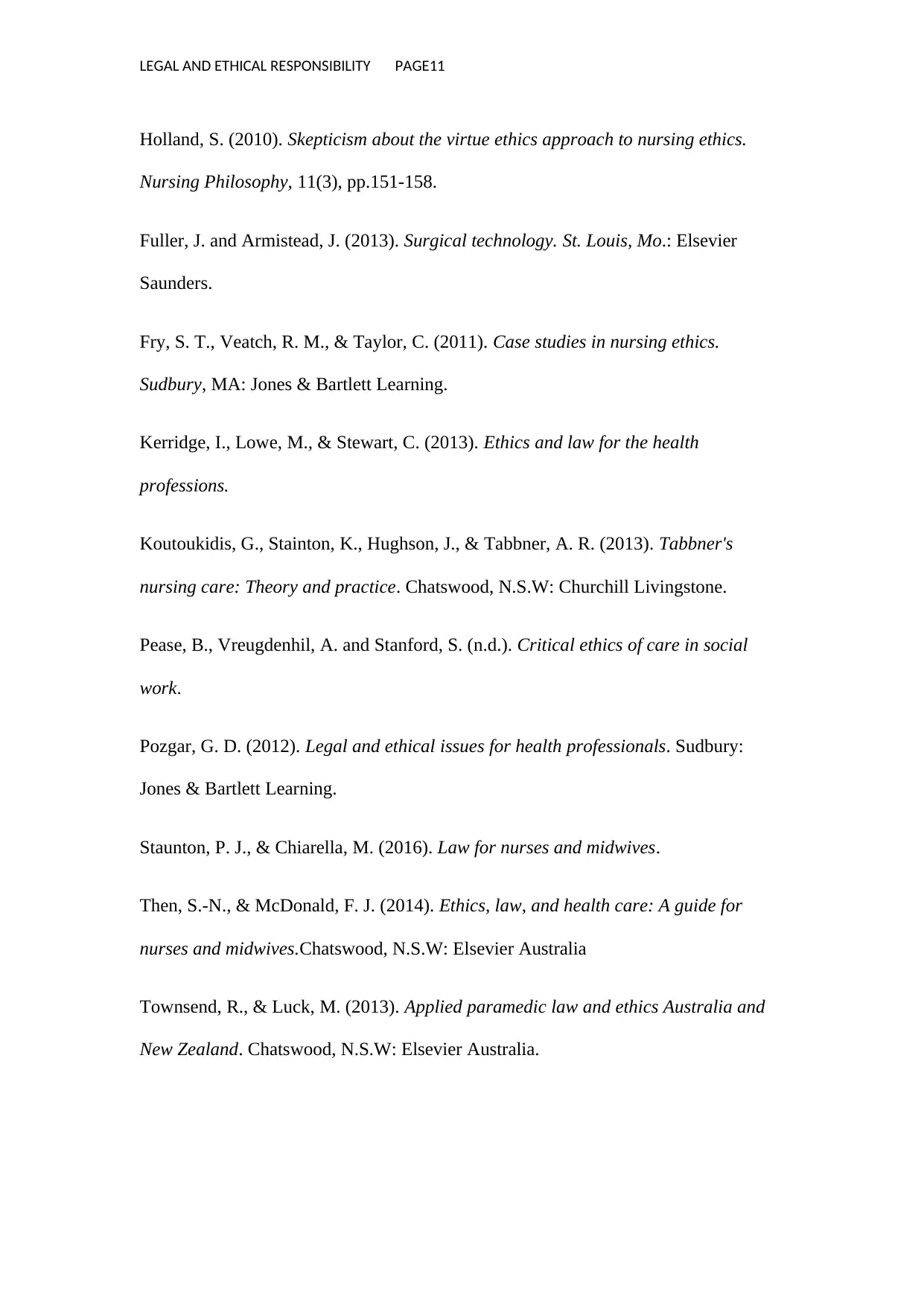
LEGAL AND ETHICAL RESPONSIBILITY PAGE11
Holland, S. (2010). Skepticism about the virtue ethics approach to nursing ethics.
Nursing Philosophy, 11(3), pp.151-158.
Fuller, J. and Armistead, J. (2013). Surgical technology. St. Louis, Mo.: Elsevier
Saunders.
Fry, S. T., Veatch, R. M., & Taylor, C. (2011). Case studies in nursing ethics.
Sudbury, MA: Jones & Bartlett Learning.
Kerridge, I., Lowe, M., & Stewart, C. (2013). Ethics and law for the health
professions.
Koutoukidis, G., Stainton, K., Hughson, J., & Tabbner, A. R. (2013). Tabbner's
nursing care: Theory and practice. Chatswood, N.S.W: Churchill Livingstone.
Pease, B., Vreugdenhil, A. and Stanford, S. (n.d.). Critical ethics of care in social
work.
Pozgar, G. D. (2012). Legal and ethical issues for health professionals. Sudbury:
Jones & Bartlett Learning.
Staunton, P. J., & Chiarella, M. (2016). Law for nurses and midwives.
Then, S.-N., & McDonald, F. J. (2014). Ethics, law, and health care: A guide for
nurses and midwives.Chatswood, N.S.W: Elsevier Australia
Townsend, R., & Luck, M. (2013). Applied paramedic law and ethics Australia and
New Zealand. Chatswood, N.S.W: Elsevier Australia.
Holland, S. (2010). Skepticism about the virtue ethics approach to nursing ethics.
Nursing Philosophy, 11(3), pp.151-158.
Fuller, J. and Armistead, J. (2013). Surgical technology. St. Louis, Mo.: Elsevier
Saunders.
Fry, S. T., Veatch, R. M., & Taylor, C. (2011). Case studies in nursing ethics.
Sudbury, MA: Jones & Bartlett Learning.
Kerridge, I., Lowe, M., & Stewart, C. (2013). Ethics and law for the health
professions.
Koutoukidis, G., Stainton, K., Hughson, J., & Tabbner, A. R. (2013). Tabbner's
nursing care: Theory and practice. Chatswood, N.S.W: Churchill Livingstone.
Pease, B., Vreugdenhil, A. and Stanford, S. (n.d.). Critical ethics of care in social
work.
Pozgar, G. D. (2012). Legal and ethical issues for health professionals. Sudbury:
Jones & Bartlett Learning.
Staunton, P. J., & Chiarella, M. (2016). Law for nurses and midwives.
Then, S.-N., & McDonald, F. J. (2014). Ethics, law, and health care: A guide for
nurses and midwives.Chatswood, N.S.W: Elsevier Australia
Townsend, R., & Luck, M. (2013). Applied paramedic law and ethics Australia and
New Zealand. Chatswood, N.S.W: Elsevier Australia.
1 out of 11
Related Documents
Your All-in-One AI-Powered Toolkit for Academic Success.
+13062052269
info@desklib.com
Available 24*7 on WhatsApp / Email
![[object Object]](/_next/static/media/star-bottom.7253800d.svg)
Unlock your academic potential
Copyright © 2020–2026 A2Z Services. All Rights Reserved. Developed and managed by ZUCOL.





